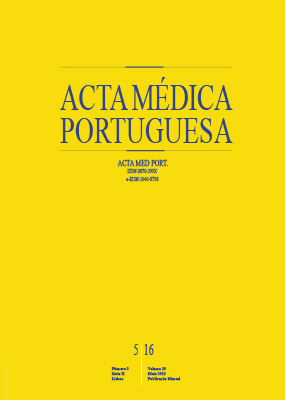Epidemiology of Vertigo on Hospital Emergency
DOI:
https://doi.org/10.20344/amp.6571Keywords:
Emergency Service, Hospital, Portugal, Vertigo/epidemiology.Abstract
Introduction: Vertigo is one of the most frequent motives in seeking specialized medical care in an emergency. The aim of this study was to evaluate the relevance of balance disorders in the Otorhinolaryngology urgency, the epidemiological characteristics and the possible seasonality. It was used a sample of patients who were assisted in a health care emergency department of this specialty, of a universitary hospital and during a period of four years.
Material and Methods: The project was conceived as a descriptive epidemiological study of population type, retrospective, during the period from 2010 to 2013. A total population of 40.173 attendances of patients during this period used the emergency eepartment of Otolaryngology. The parameters studied included age, gender, annual number of cases (total and percentage), date of crisis of vertigo, seasonal distribution by seasons and annual proportion of hospitalized cases.
Results: A total of 4.347 patients (10.8%) sought medical attention due to dizziness/balance disorders over the four years of the study. There has been an annual increase in the number of cases between 7.6% (in 2010) and 17% (in 2013). Women were more often affected (68.3%) and crises occurred more often in individuals between 60 and 79 years of age (40%). The cases were distributed heterogeneous between the seasons, having more episodes of dizziness in summer and autumn and with an increasing trend between 2010 and 2013. The number of hospitalizations has increased annually over this period.
Discussion: The epidemiology of vertigo and vestibular disorders is still a specific field to study, because it may be useful for clinical decision-making and health care planning.
Conclusion: The study revealed that cases of vertigo in urgency increased annually and are more frequent in women, in elderly population and in Summer and Autumn.
Downloads
Downloads
Published
How to Cite
Issue
Section
License
All the articles published in the AMP are open access and comply with the requirements of funding agencies or academic institutions. The AMP is governed by the terms of the Creative Commons ‘Attribution – Non-Commercial Use - (CC-BY-NC)’ license, regarding the use by third parties.
It is the author’s responsibility to obtain approval for the reproduction of figures, tables, etc. from other publications.
Upon acceptance of an article for publication, the authors will be asked to complete the ICMJE “Copyright Liability and Copyright Sharing Statement “(http://www.actamedicaportuguesa.com/info/AMP-NormasPublicacao.pdf) and the “Declaration of Potential Conflicts of Interest” (http:// www.icmje.org/conflicts-of-interest). An e-mail will be sent to the corresponding author to acknowledge receipt of the manuscript.
After publication, the authors are authorised to make their articles available in repositories of their institutions of origin, as long as they always mention where they were published and according to the Creative Commons license.









